Advice for a healthy heart from one of India's top heart surgeons.
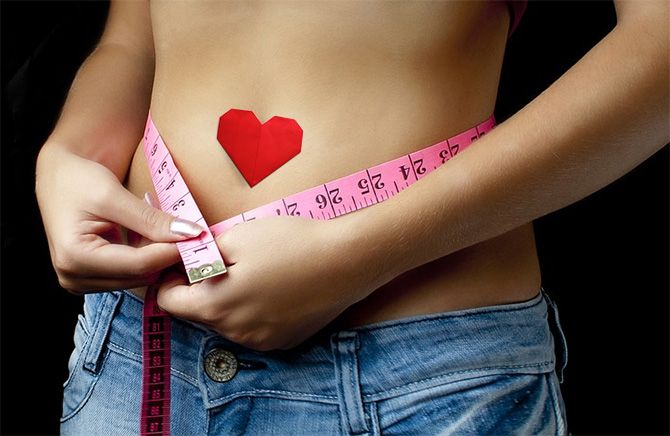
Illustration: Dominic Xavier/Rediff.com
If India gallops ahead with its current rate of heart disease, Dr Ramakanta Panda, head of the Asian Heart Institute in Mumbai, who has performed close to 25,000 heart surgeries, fears the nation will be looking at a $4 trillion heart care problem in the future.
That is a national cardiac bill India can ill afford.
The only way possible to avoid such an epidemic, Dr Panda asserts, is Healthy Heart Management.
"Alcohol has no health benefits to prevent heart disease," Dr Panda tells Rediff.com's Vaihayasi Pande Daniel in the final segment of a three-part interview.
- Part I: 'Heart disease is not a death sentence'
- Part II: Advice from India's top cardiac surgeon: How to keep your heart healthy
What has been one of your most interesting cases as a surgeon? Most complicated case?
I started my career in Bombay with a patient like that.
It was the third patient of mine. In those days -- I am talking about 1993, I still remember it was 22 January -- angioplasty was still evolving and the complication risks were higher.
For this patient, during angioplasty, the heart stopped. The heart was not reviving. So they approached me and they had already been massaging for 15, 20 minutes -- technically the person was dead.
So I talked to the family. I said extremely high risk, very little chances of survival. (They said) whatever it is, you should take the risk and go ahead and operate.
I operated. The person was in coma for a month or so. But he survived. Still alive 26 years later. This was in Breach Candy (hospital, south Mumbai). Twenty-six years later, that person is still alive and doing well.
So it was one of my first and very satisfying at the very beginning of my practice here in Mumbai.
Since then, I have done many, many, highly complex cases.
Recently we did one youngster. Twenty years old. He had a valve replacement at the age of 13 or 14. He was very small (then). Very small valve because the heart was small that time.
Earlier,had put in a 17 mm valve. He had become a tough 5'11" tall boy and already 80 kilos.
The valve has become very small for him. Unfortunately, when you do valve replacement that area become very, very tight. It doesn't increase in size.
I had to do a very, very complex valve replacement and put in a 23 mm valve; where I had to cut inside the heart open and I had to enlarge the heart from inside. Very, very complex.
Plus, in the meantime his main pipe burst out. I had to do aneurysm surgery. So, in total, it involved five types of surgery. The boy is doing extremely well.
How long did that surgery take?
That was 17 hours of surgery.
Today I am doing one exactly like that. This young lady already had two surgeries before. That boy had surgery second time. This (lady) I am doing for the third time. It will go in for 17 hours now.
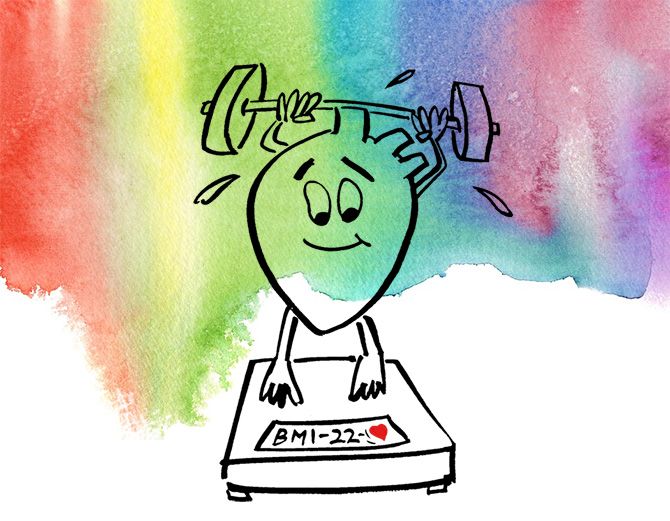
Illustration: Dominic Xavier/Rediff.com
How do you know if you are in the hands of a good heart doctor? I believe you and your hospital have been leading this campaign against 'cuts' (given for a recommendation by another doctor).
Where should you go when you first think you have heart illness? To a GP? Or should you find a cardiologist?
How do you not get into the hands of a cardiologist who unnecessarily suggests angioplasty?
If you strongly suspect you have a heart problem, it is better to go at least to an MD physician, not a general practitioner.
An MD physician has a little better knowledge about diagnosing and treating the heart disease. I don't think there is any indication to go to a cardiologist straight away.
If the physician thinks you have a higher possibility of heart disease, then you need to see a cardiologist.
The first check up you routinely do is an ECG. But unfortunately the ECG doesn't show anything. Unless the person already got a heart attack or something the ECG will not show any changes.
If the cardiologist suspects the person has a possible heart blockage then they do what is called a stress test. Because no matter how critical block a person has usually the heart still gets adequate blood supply at a rest condition like if you are sitting in a chair.
Even if I have a 90 per cent blockage the heart still gets adequate blood. The moment you do additional exercise and the heart needs more blood, then it shows up.
There are various types of stress tests. There is the regular stress test which is a little less effective in diagnosing heart disease.
There is something more specific which is called stress thallium or stress echo. That is far more accurate. One can do that.
If that is showing as a positive, then one has to go for an angiogram. If that is negative 0nce can mange it medically.
There is something called CT calcium scoring, just like X-ray, takes a few seconds to do. And it has very less radiation. If the CT calcium score (cardiac CT for calcium scoring) is showing that it is zero, chances of the person having a blockage is very less.
So not a heart echo?
Stress echo is the one. Echo cardiogram doesn't show any blockage. It will only show up if a person has already got a heart attack. Heart pumping will be less. Echo cardiogram is largely done mainly to diagnose people who have a valve problem. Not the blockage problem.

Say your stress test is not good. And the cardiologist advises an angioplasty. How do you know that is what you need? Should you take a second opinion?
My strong advice will always be take a second opinion.
And that's very important?
Very important.
Because unfortunately there are a lot commercial decisions behind advising a patient angioplasty or surgery.
Always, I will advise go for a second opinion.
Almost 80 per cent patients with a heart blockage can be managed with medicine today. Nobody tells that.
Eighty per cent can manage with medicine. Twenty or 25 per cent patients would need some sort of intervention, that could be angioplasty or surgery.
It depends on how critical the blockage?
Yes, how critical the blockage. If a large area of the heart is affected. If a small area is affected, then nothing will happen. But if a large area is affected and there is a risk to a patient's life, it is prudent to do it.
So 75 to 80 per cent can manage with medicine. Twenty-five per cent of the time they need to do this (surgery).
What gives you the most satisfaction as a heart surgeon? What is your moment of satisfaction?
Satisfaction for me is when I know the person is dying and I save his life.
I do a surgery and the next day the person is nice and doing well in the ICU. And three days later comes out of the ICU.
Seven days later he is walking around. That is the greatest achievement, I think. That gives the greatest pleasure.
And how many moments have you had like that over the years?
I have done close to 25,000 surgeries. One of the highest in the world.
A lot of people worry about WiFi in phones near you and charging phones. Can that affect the heart?
Personally, if you ask me, at this stage there is not enough scientific evidence. But I think there is always an electromagnetic wave.
No, Wifi doesn't affect the heart. But mobile phone should not be kept in proximity to the heart.
There is a possibility of a higher incidence of brain tumour. That's the reason I always use the cord. I don't use the phone directly on my ear.
WiFi as well?
Wifi is bad. As bad. There is Wifi all around us today. The only concern is if you use it in your ears all the time (for example the bluetooth), because it involves electromagnetic radiation.
But you don't think it will affect the heart.
No. No. Only people with a pacemaker. They should not keep it. Because there is a magnet there. Though a lot of new pacemakers are designed not to be affected by a magnet.
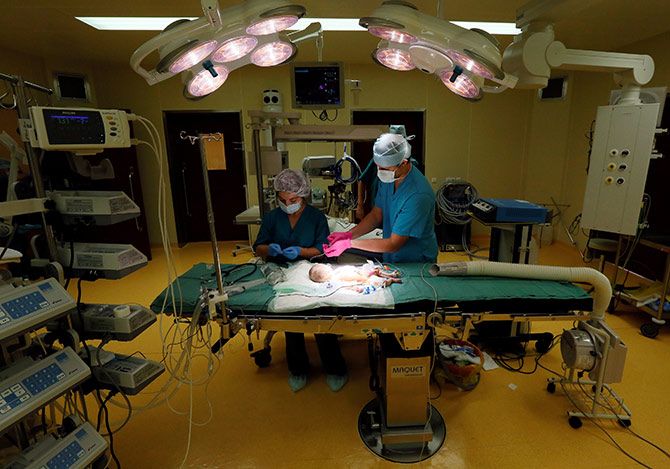
What advice can you offer about drinking alcohol and its effect on the heart? Which alcohol is preferable? How much is too much?
Alcohol has no health benefits to prevent heart disease. It is a misnomer that consuming alcohol prevents heart disease, to the extent that the earlier WHO recommendation was that alcohol should not be prescribed by doctors as a recommendation for heart disease.
Even the recent guidelines from the UK have very clearly stated that the amount of alcohol consumption should be kept to less than seven glasses of wine or six pints of beer per week to reduce the risk of cancer and other diseases. Which means that drinking alcohol is harmful.
I also believe you take a lot of satisfaction in patients who have plenty of longevity post surgery, like you mentioned your first case... And Dilip Kumar...
Dilip Kumar. Twenty-two years we have treated. Heart is doing fine though. Dr Manmohan Singh just completed ten years since surgery on March 24, exactly ten years back. He is doing well. We operated on Laluji (Prasad Yadav), then Mr Tarun Gogoi.
It would depend on the way they run their post operative life.
Most of them are leading a very good heart healthy life style.
What is the most important breakthrough you would like to see in your fields as a surgeon?
To do surgery with minimum cut because that is the next big step. so that the person can recover much faster. Because still we got a six inch cut.
I prefer the keyhole. Technology is going in that direction. It will take a few years to develop that.
Any breakthrough you would like to see for India?
One will be universal accessibility of heart care.
Second is (it should be) cheaper. Cheaper is only possible provided our entire thing is manufactured in India. Stents, yes.
How much about heart illness is luck?
Genetics is the luck component. Everything else you control.









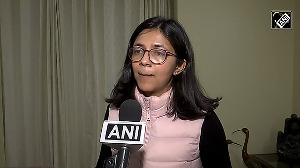
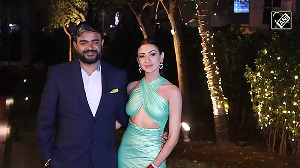
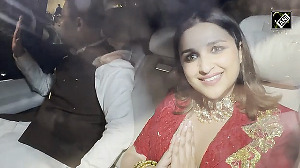
 © 2025
© 2025